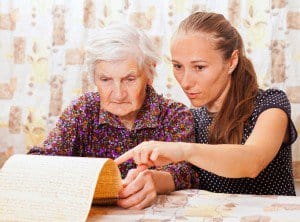 According to a 2009 study completed by AARP, there are over 65 million people in the U.S. that are acting as unpaid caregivers to provide care for an adult who is ill or has a disability. This number makes up approximately 29% of the U.S. population that are spending an average of 20 hours a week providing care for a loved one. Roughly two-thirds of these caregivers are women, and more than 37% have children or minor grandchildren that live with them that they also need to care for.
According to a 2009 study completed by AARP, there are over 65 million people in the U.S. that are acting as unpaid caregivers to provide care for an adult who is ill or has a disability. This number makes up approximately 29% of the U.S. population that are spending an average of 20 hours a week providing care for a loved one. Roughly two-thirds of these caregivers are women, and more than 37% have children or minor grandchildren that live with them that they also need to care for.
Caregivers who are providing for an elderly or disabled loved one can encounter a variety of challenges such as how to provide help to someone without any fall detection devices. Time management can become a problem, and according to the National Alliance for Caregiving, over 50% of caregivers report that their caregiving responsibilities have led to sacrificing hobbies, vacations, and personal relationships. Choosing a medical alert device by reading our Bay Alarm Medical reviews can help alleviate some of the stress. These added duties can also lead to competing demands a when a caregiver needs to work while balancing the needs of their ill loved one and the rest of their family.
Unpaid caregiving can result in physical, mental, and financial stress. The emotional and physical tolls can be great for people who need to provide intensive care over a long period of time. Additionally, the out-of-pocket costs that are accumulated by the caregiver for travel, medical insurance, transportation, medications, and food can create a severe financial hardship. Fortunately, if caregivers know where to look, there are resources available to help ease the financial, physical, and mental strain that they are experiencing.
Caregiving Challenges – The top challenges facing caregivers.
Family Caregiving Facts – Information from the Centers for Disease Control and Prevention.
Caregiving Statistics –Statistics about family caregiving and family caregivers.
Family Caregivers – The American Psychological Association answers the question, “Who are family caregivers?”
Caregiver Burnout – Tips for recharging when you feel burnt out as a caregiver.
Young Caregivers
 A young caregiver is a person under the age of 25 who is providing significant care for a family member, often due to their parent’s mental or physical illness, addiction, or disability. Young caregivers may also be referred to as young carers or youth caregivers. An independent study by the Cowichan Family Caregivers Support Society found that approximately 12% of youth identified themselves as young caregivers, but despite this high number, not enough support is available for these young carers.
A young caregiver is a person under the age of 25 who is providing significant care for a family member, often due to their parent’s mental or physical illness, addiction, or disability. Young caregivers may also be referred to as young carers or youth caregivers. An independent study by the Cowichan Family Caregivers Support Society found that approximately 12% of youth identified themselves as young caregivers, but despite this high number, not enough support is available for these young carers.
While numerous positive aspects of family caregiving exist, youth caregivers can encounter some harmful and negative outcomes of being a family caregiver. Financial restrictions, emotional stress, and isolation from their peers may all be problematic. Additionally, a study by the University of Miami Miller School of Medicine found that of the more than 1.3 million children who identified as caregivers, a vast majority faced challenges with keeping up with their school work while also juggling the adult-sized responsibility of caring for an aging, disabled, injured, or ill family member.
Young caregivers should seek out resources that can help them to better manage their day-to-day responsibilities along with their role as caretaker. These caregivers should contact their local social or human services organization to find assistance with transportation, health insurance, meals, and home care that may be available in your area to help your loved one. Social networking is also making it easier than ever to connect to caregiving resources, including Facebook pages like CaregiverVillage and Caring for the Caregiver.
Who are Young Carers? –Information from the Cowichan Family Caregivers Support Society.
Young Carer Resources –Help for young caregivers.
Young Caregivers and School – Study shows that young caregivers risk failing.
Grandchildren as Caregivers – Resources and helpful tips from AARP.
Helping a Young Caregiver – Tips from the Center for Advancing Health.
Family Caregiving Tips
 If your family member has a serious injury or medical illness, you might be called on to provide care for him or her. Most family caregivers are forced to learn the ins and outs of caregiving “on the job” and quickly discover challenges that they may not have imagined prior to becoming a family caregiver. Caregiving can be both emotionally and physically exhausting, and you may need to drastically alter your home environment and lifestyle in order to accommodate your ill or elderly loved one.
If your family member has a serious injury or medical illness, you might be called on to provide care for him or her. Most family caregivers are forced to learn the ins and outs of caregiving “on the job” and quickly discover challenges that they may not have imagined prior to becoming a family caregiver. Caregiving can be both emotionally and physically exhausting, and you may need to drastically alter your home environment and lifestyle in order to accommodate your ill or elderly loved one.
Family caregivers need to remember to also care for themselves. This may mean asking for and accepting help if they are feeling overwhelmed. Many caregivers don’t want to feel like a burden to others, but failing to accept help can lead to caregiver burnout. Instead, have a list ready of ways that others may be able to help you. For example, ask a neighbor to pick up a few items for you at the grocery store, or have a friend take your ill or elderly loved one on a 15 minute walk a few times per week. By breaking down jobs into simple tasks, it is easier for others to help you.
Family caregivers are also at risk for feeling isolated and alone. Even though you may need to spend more time at home caring for your loved one, make an effort not to lose connections to friends, other family members, and loved ones. Reach out to caregiver resources that can help you to alleviate stress and better manage your life. Also consider joining a support group that will help you connect with others who are in your same situation.
Family Caregiver Survival Tips – Helpful information from the Center for Advancing Health.
Caregiving and Depression – Signs to look for and tips for taking care of yourself.
Holiday Caregiving Tips – Holiday tips for caregivers.
Respite Care – Use respite care to get a break while serving as a family caregiver.
Self-Care for Caregivers –Family caregivers need to remember to care for themselves first.
Caring while Working?
 A majority of caregivers also work full-time. While some are open about their role as a caregiver, others keep this information to themselves so that they don’t face repercussions at work. However, many caregivers find that letting their employer know about their situation at home is a good idea, as it will help him or her to better understand the challenges that you are facing.
A majority of caregivers also work full-time. While some are open about their role as a caregiver, others keep this information to themselves so that they don’t face repercussions at work. However, many caregivers find that letting their employer know about their situation at home is a good idea, as it will help him or her to better understand the challenges that you are facing.
Caregivers who work may benefit from changing their schedules to better accommodate their ever-changing role as a caregiver. If you need to primarily help your ill or elderly loved one in the mornings, a job in which you could work during the afternoon or evening may be better suited for you. Some employers may allow you to work flexible hours or to telecommute so that you can better manage your roles as employee and caregiver.
There are also other steps that you can take to make your life easier when acting as a caregiver while working. Consider ordering and purchasing your loved one’s medical supplies online in order to ease some of the pressure that you are feeling. This could eliminate several trips to the pharmacy or medical supply stores, as the items that you need will be conveniently delivered to your home. Even this small change can make a big difference in your ability to manage your life as an employee and a caregiver.
Working and Caregiving – How to balance the two.
Overcoming Caregiver Stress – Tips for dealing with caregiver stress.
Caregiver Support – Find online caregiver support groups.
Full-time Employment and Caregiving – Helpful tools for caregivers.
Caregiving and Work – Why you shouldn’t have to choose between the two.


